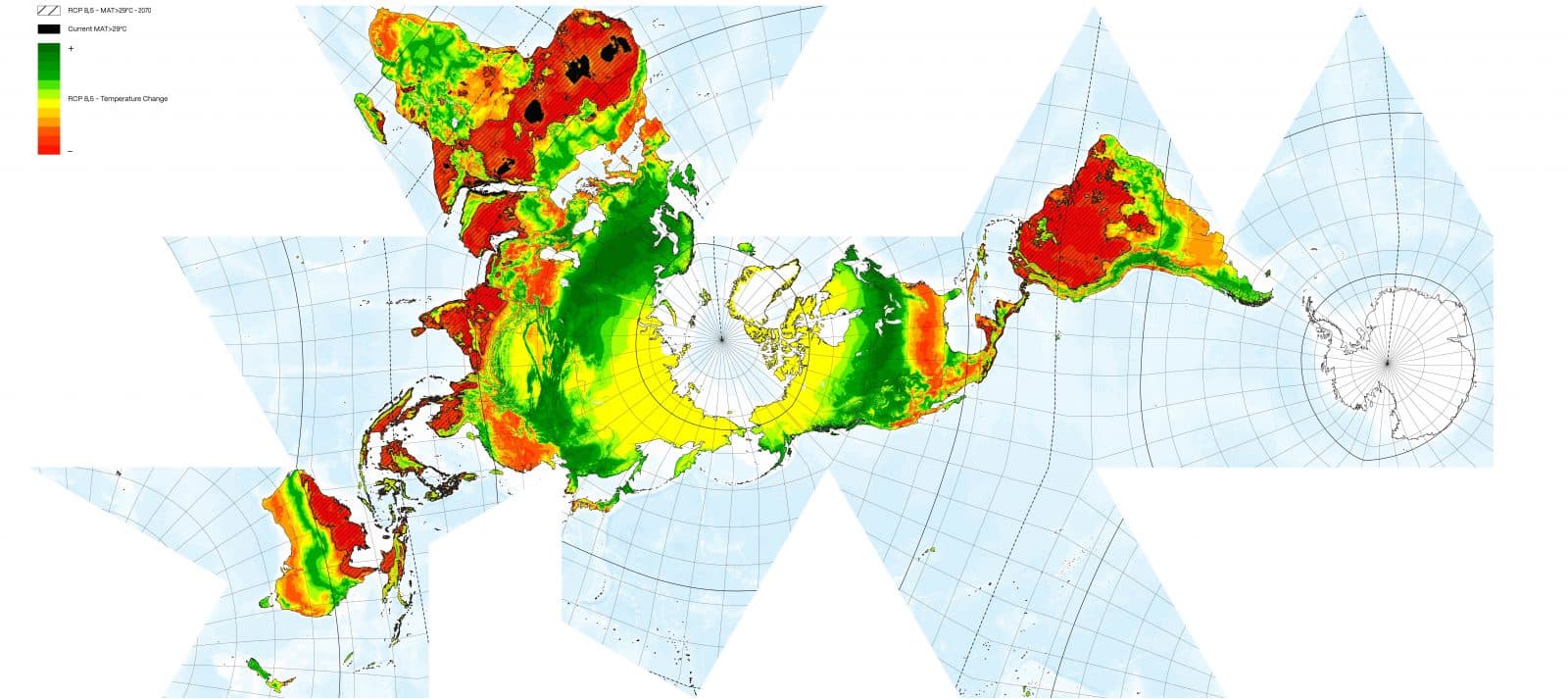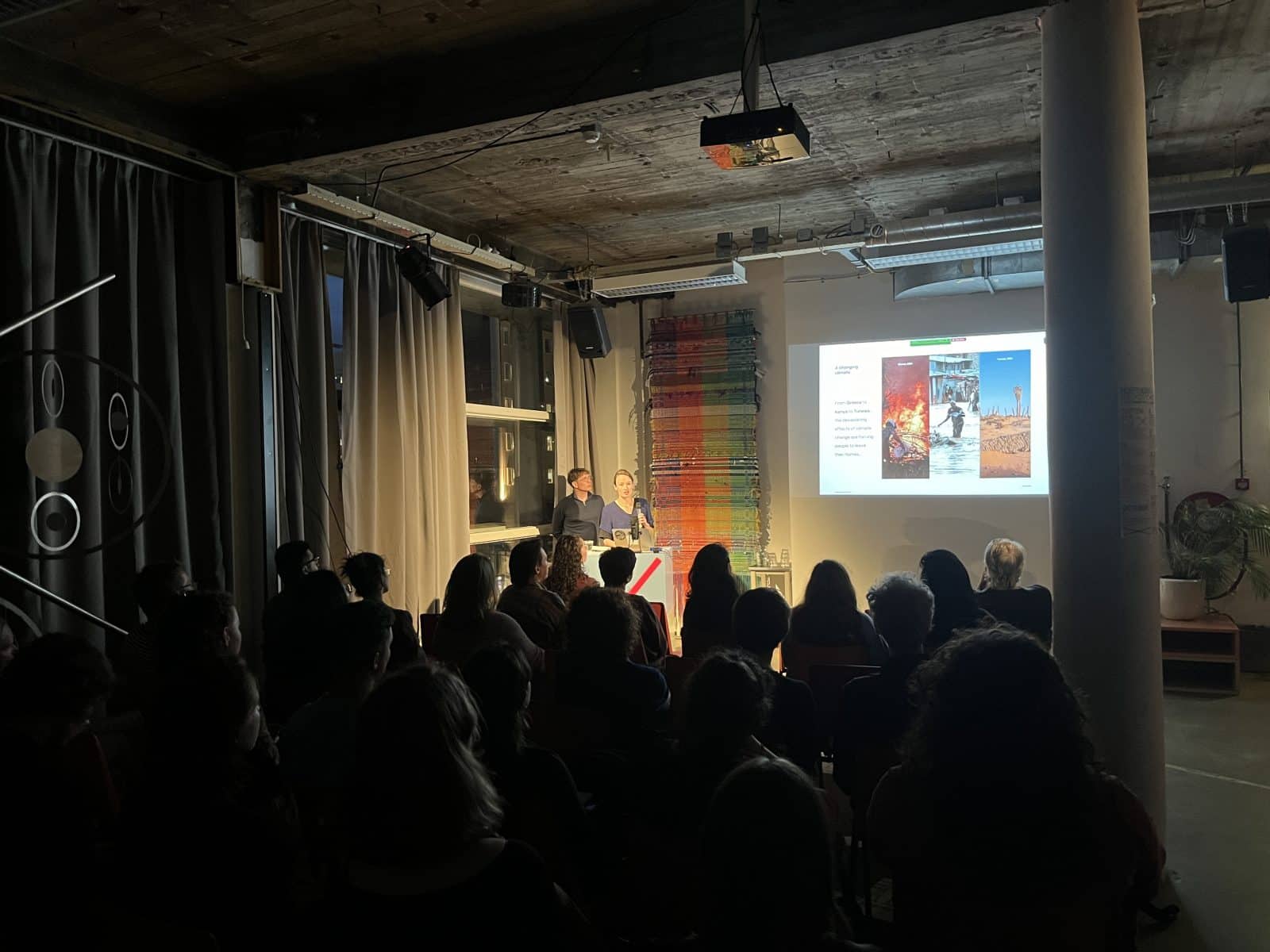Back to School with… Lena Knappers & Bram van Ooijen
A warming planet and a shifting population
A series of three evening lectures about climate change, environmental justice and migration, taking place on Tuesday 08 October, 05 November and 10 February.

Climate-induced displacement and migration
From California to Somaliland to Bangladesh, the devastating effects of climate change are forcing people to leave their homes. Climate change increasingly is a reason for displacement and migration. This may be because of a particular catastrophic event, such as a river flood (The Netherlands 2021), flash flood (Germany 2024) or wildfire (Greece 2023), but it can also be the result of cumulative impacts of drought or sea-level rise, slowly making an area uninhabitable. The majority of people who become displaced, remain in their own country and move to cities, but a number cross international borders, and this is likely to increase as climate change impacts on entire regions and ecosystems. This foreseeable migration will involve the world’s poorest, escaping deadly heatwaves or failed harvests, but it will potentially also include middle class people who can no longer live where they planned, because it is impossible to get a mortgage or a property insurance in certain areas, or because employment has moved elsewhere. The United Nations International Organisation for Migration (IOM) has cited estimates of as many as 25 million to 1 billion climate migrants in the next 30 years, while other projections point to 1.4 billion by 2060.
Climate induced migration takes place disproportionally in low-income countries and intersects with many other causes for displacement. The people most affected by climate change are those already experiencing threats to their lives and livelihoods, including degraded environments, income instability, lack of affordable healthcare, inadequate sanitation, poor governance, and a lack of personal agency or ability to change their circumstances. Nations have an obligation to offer asylum to refugees, but under the legal definitions of the refugee, still based on the 1951 Refugee Convention, this does not include those who have to leave their home because of climate change. Therefore, many people cannot find a safe and healthy place to live because they are not qualified as refugee. At the same time, the world’s wealthiest countries spend more on arming their borders to keep migrants out, than on tackling the climate crisis that forces people from their homes in the first place, even when exactly these prosperous industrial countries have caused climate change and high carbon emission based on coal, oil and gas. This comes at a terrible human cost. It is therefore important to investigate in more just alternatives for the way we are dealing with climate change, migration and the organisation of space today.
This lecture series examines the impact of climate change on the liveability of our world and the potentialities of space. Where is climate-induced displacement and migration already happening today? Which areas will be most affected by global warming? Where can people move to and how can new places for living be built?
This lecture series derives from the research and design project ‘Humanity on the move’, which was part of the open call ‘designing a climate just world’, organised and subsided by the EFL Foundation. More info here.
About Back to School with...
For Back to School with... we invite professionals, makers and (critical) thinkers from inside and outside the field of architecture and urban design to share their most current thoughts, recent questions and latest or ongoing research. For each series we ask a professional guest to design and curate a lecture programme around one topic or question that has their urgent and great interest at this moment and to bring together different speakers to elaborate on the subject in three consecutive evening events.
This program pursues no greater ambition than to stimulate and provide space to exchange and commonly learn about latest research topics from other professionals and build up new knowledge for everyone who shares our curiosity.
Programme
#1 THE IMPACT OF CLIMATE CHANGE ON THE WOLRD TUE 08 OCT. 2024, 19:00 - 21:00 (DOOR OPEN AT 18:00)
Over the next century we will face several climate crises that might force millions of people to leave their homes. On the first evening we will discuss the impact of climate change on areas and communities around the world with Lena Knappers, Bram van Ooijen, Amara van der Elst, Elham Sabahat (online) and IOM Climate Action Division (online).
On the second evening we examine how climate change and migration are dealt with today. We will explore how countries with the highest historic carbon emissions are fortifying their borders, while those with low emissions are hit hardest by drought, poverty and population displacement. With Lena Knappers, Bram van Ooijen, Mark Akkerman and Mimi Sheller (online).
Not only does a global fixation on borders as a solution to migration cause unnecessary suffering on people, it also obscures ways that seek and identify and begin to find solution to a future of more displacement and migration, a future that invites more generosity and responsibility. In the third event we examine alternative strategies to deal with migration in the context of a changing climate.

About Bram van Ooijen
Bram van Ooijen (Murb, 1987) is an urban designer and founder of design firm UFO Urbanism in Rotterdam. With his practice he works on various projects at the scale of the region, city and neighbourhood.
About Lena Knappers
Lena Knappers (Leiden, 1992) is an urbanist and researcher. She operates at the intersection of design, politics and social issues with her work at the Dutch Board of Government advisors (CRa) and own projects. In 2022 Lena published the book 'Opening Cities - Migrants in Urban Space', presenting an alternative approach to the organisation of migration in the European city.